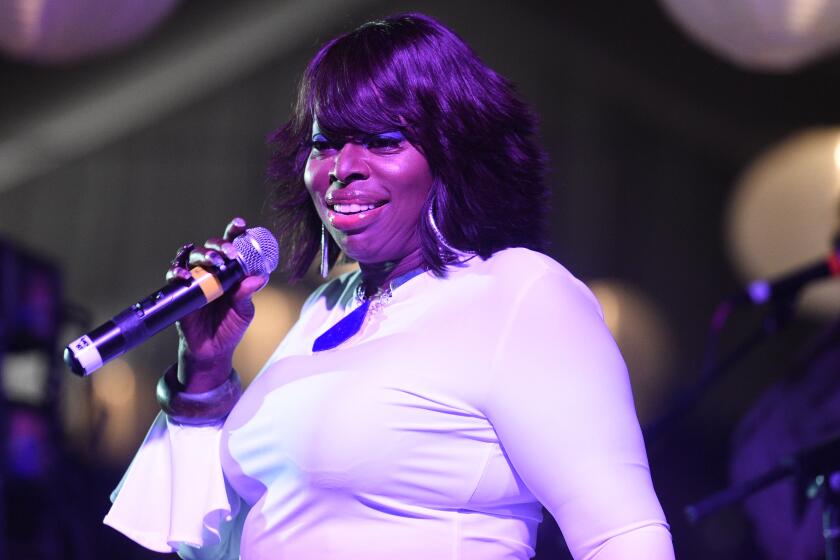McCartney show touches a nerve
- Share via
JERUSALEM — There’s a new Israeli government being formed amid great uncertainty and divisive haggling. On Monday night, a Palestinian plowed his car into a group of Israeli soldiers in Jerusalem, injuring at least 13 people.
But Israel’s popular Army Radio news station is spending much of its airtime playing the Beatles’ greatest hits. Callers and local celebrities are being asked to reminisce about their favorite song by the Fab Four or Paul McCartney.
More than 40 years after the Beatles were banned from playing in Israel, McCartney-mania has taken hold here ahead of Sir Paul’s concert tonight in Tel Aviv. The performer, who arrived in Israel on Tuesday, is being treated to pomp and speculation exceeding that of most major heads of state.
Presidents and prime ministers come and go here, but McCartney’s first concert in the Jewish state has touched a strong nerve.
“Some here have called it the greatest cultural event in our 60-year history,” wrote Jerusalem Post Editor in Chief David Horowitz, who published his lengthy interview with McCartney -- alongside the editor’s political take on selections from the Beatles’ collective songbooks.
On “Give Peace a Chance,” which was actually released as a single by John Lennon in 1969, Horowitz wrote: “Believe me, Paulie, we’ve tried. We said yes to two states in 1948, and we’ve been doing so ever since. Have you thought about singing this to the Iranians?”
McCartney arrived along with a reported 80 tons of speakers, instruments and stage equipment. His band and entourage occupy 21 suites at a luxury Tel Aviv hotel, and McCartney’s grand-piano-equipped suite previously hosted former President Clinton and rock star Bono, according to local media reports.
Tickets for tonight’s performance range from about $150 to nearly $1,500, the latter for VIP seats next to the stage in Tel Aviv’s Hayarkon Park.
“I’m always interested in visiting places I’ve never been to before,” McCartney told Horowitz. “I’d like to go [to Israel] and see what’s what.”
But despite McCartney’s assertion that he is “quite apolitical,” he hasn’t been able to avoid the gravitational vortex that is the Israeli-Palestinian conflict.
His arrival here comes after months of pressure from pro-Palestinian activists urging him to cancel the show and boycott performances in the Jewish state.
“What will McCartney open with, ‘Pipes of Peace’ or ‘Ebony and Ivory’? Given the reality on the ground, which he refuses to acknowledge, why not open with ‘Live and Let Die’ to a rapturous Israeli audience?” wrote columnist William Parry on the Electronic Intifada website, citing McCartney songs.
Parry speculated that Lennon would have proudly joined the boycott in protest over Israeli actions in Palestinian territories.
A group called the Palestinian Campaign for the Academic and Cultural Boycott of Israel issued a statement calling McCartney’s concert “morally equivalent to performing in South Africa at the height of the apartheid era.”
McCartney and his managers have politely brushed off the boycott calls, saying the singer’s message and music are beyond politics. He visited Bethlehem’s Church of the Nativity on Wednesday, and said his stop in the West Bank showed he was not playing favorites.
“I get criticized everywhere I go, but I don’t listen to them,” said McCartney, who said he advocates a peaceful two-state solution between Israelis and Palestinians. “I’m bringing a message of peace, and I think that’s what the region needs.”
Pro-Israeli bloggers and commentators rallied to his defense. Joel Leyden of the Israel News Agency called him “an icon of freedom, democracy and artistic free speech.”
The hard feelings on the Arab side linger. McCartney’s concert is being presented as part of Israel’s yearlong 60th anniversary celebrations, and his status as a global pop music icon brings a cultural legitimacy that Israelis crave and Palestinian activists regularly struggle to deny.
The war of words took on a threatening tone when the British tabloid Sunday Express quoted Omar Bakri Mohammed, a radical Syrian sheik based in Lebanon, on the subject.
“If he values his life, Mr. McCartney must not come to Israel,” Bakri told the newspaper. “He will not be safe there.”
The concert is expected to take place under heightened security, but Bakri’s remarks weren’t expected to discourage Israeli fans from attending.
The show’s promoter said today’s concert was a chance to make up for 1965, when the Israeli government banned the Beatles from playing here -- reportedly for fear that their music would corrupt Israeli youths.
--
More to Read
The biggest entertainment stories
Get our big stories about Hollywood, film, television, music, arts, culture and more right in your inbox as soon as they publish.
You may occasionally receive promotional content from the Los Angeles Times.










